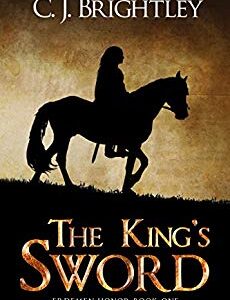An ex-soldier, Kemen Sendoa, is not so much retired as left for dead after his squad was ambushed by a barbaric people north of the kingdom of Erdemen. He is wandering through the woods alone, grieving over the death of his best friend. He comes across a trail in the snow, follows out of curiosity, and finds a seventeen-year-old boy unconscious.
What a wonderful book! The King’s Sword fits squarely into the sub-sub-genre of ‘spoiled young man gains character through hard work and trials’. This a kind of tale I generally enjoy and specifically here enjoyed a great deal. The story is told from the point of view of an ex-soldier who is trying to teach a prince who is fleeing soldiers meant to kill him.
If you need wizards throwing fireballs to be happy with an epic fantasy, this is not your book. There is no magic in the novel, just people doing the best they can under atrocious circumstances. If you like character-driven stories that are a little slower, you might enjoy this as much as I did.
I can’t tell you how much I enjoyed spending time in Kemen’s mind. He is thoughtful and careful, thinking through his past, strategy, the character of the boy, training, and the meaning of the names of everyone he meets. Through patience, discipline, stoicism, and long endurance, he reacts with kindness instead of violence to the constant racism he meets among his fellow countrymen for being of a different race than most of the people of Erdemen. Despite the racism, he loves his country and loves defending it. I’ve known a lot of people who are the kind who run toward danger to help, and so I found his character to be believable in that aspect. His adoration of women is adorkable. He has resigned himself to never marrying and having children, but he loves it when a serving girl smiles at him. He considers privation to be another chance at discipline. He’s a great man who doesn’t know he’s great.
Through patience, discipline, stoicism, and long endurance, he reacts with kindness instead of violence to the constant racism he meets among his fellow countrymen
The prince, Hakan Ithal, constantly complains to the point that one wants to strangle him from time to time. Even though Kemen is totally unimpressed by the boy, his loyalty demands he do whatever he can to keep the prince safe and to train him how to fight. Hakan must live with the results of the bad decisions his father made before he was assassinated. As Hakan and Kemen roam the country, the prince learns about why so many were angry at the king.
There are occasional scenes of violence, wounds, and death, and one scene of torture, but nothing is graphic. The recovery time from wounds, use of horses, fighting techniques, and survival skills are realistic. Boys who have trouble with reading might find inspiration in Kemen, who becomes a leader of men despite being incapable of learning how to read. How one becomes good at anything is beautifully shown. Instead of the prince instantly becoming proficient at sword fighting, he gets better gradually.
Boys who have trouble with reading might find inspiration in Kemen, who becomes a leader of men despite being incapable of learning how to read.
I had little to quarrel with in the book, though there was a spot or two that made me laugh. Kemen sends Hakan out to gather wild onions for the stew. Inside I shouted, “Wild onions in the forest? Under snow?” Who knows, maybe wild onions behave differently in that world than they do on Earth. Some people might object to the strict hierarchies that are observed without question, but that is realistic in the given setting.
I recommend The King’s Sword to any lover of fantasy over the age of fifteen. Anyone under the age of fifteen or so may find some of the thinking about strategy and discussion of fighting techniques confusing or boring. An adult book clean enough for teens As an adult, I loved it all.
Ratings
Heat: None
Violence: Sporadic and non-graphic
Language: Any cursing is made-up fantasy words
The King’s Sword is available at Amazon and Audible.
I was loaned a free copy of the ebook for purpose of an honest review.
Lelia Rose Foreman homeschooled her three boys for a total of fourteen years. They survived. She writes Christian science fiction. Under the name of Rose Foreman, she also writes general market science fantasy with her oldest son, Josh. The first of these is The Scarred King: Exile, which just launched.



 Win All Three of Lauren Salisbury’s E-books by Subscribing to Our Newsletter!
Win All Three of Lauren Salisbury’s E-books by Subscribing to Our Newsletter!
Leave a Reply